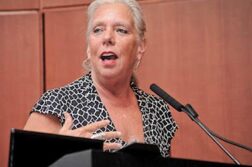A number of prominent gay and lesbian writers, artists, and activists passed away in 2002, among them the following:
Kevyn Aucoin, makeup artist to the stars and author or co-author of several coffee table books, was forty when he succumbed to complications from a brain tumor on May 7. His clientele was a who’s who of Hollywood, Broadway, and runway model superstars. Aucoin had overcome an unhappy childhood filled with abuse and bullying. His salvation was fashion and his childhood beauty idol was Barbra Streisand. Aucoin left his home in Louisiana in his teens and by age 21 had done the makeup for his first Vogue cover.
Philip Brett, the first musicologist to discuss the relationship between music and homosexuality, died of cancer on October 26 at the age of 64. A professor at the University of California, he was the author or editor of many scholarly works, including Queering the Pitch: The New Gay and Lesbian Musicology. He broached Benjamin Britten’s homosexuality in 1976 in his discussion of “Peter Grimes.”
Timothy Findley, whose early works have been compared to those of Truman Capote, died on June 22 of complications following a fall. Born in Toronto, his first career was as an actor. One of Canada’s most honored authors, his corpus includes twelve novels and a number of short stories, plays, and memoirs. Though openly gay—his relationship with his lover lasted 35 years—he did not want to be labeled as a “gay writer.” In an interview, he stated that a “thread that runs through all my work has to do with unlikely people being confronted with uncommon events.” His most recent novel was Spadework (2001).
Charles Henri Ford, who was born in Mississippi but who lived in places as exotic as Katmandu and Crete, died on September 27 at the age of 94. He was the first American surrealist poet; the founding editor of several literary magazines (one of which gave Paul Bowles his first publication); and the co-author (with Parker Tyler) of one of the first openly gay American novels, The Young and Evil (1933), which was banned in the U.S. for thirty years. Ford knew everyone from Gertrude Stein to Andy Warhol. An article in this journal (Nov.-Dec. 2001) by filmmaker James Dowell describes his documentary about Ford’s life and times, Sleep in a Nest of Flames. Ford’s last book was Water from a Bucket: A Diary, 1948-1957 (2001), a gossipy survey of his life with American and European artists and writers and his quarter century with his lover, the artist Pavel Tchelitchew.
Kay Gardner, one of the founding mothers of the women’s music movement, died August 28 of a heart attack at her home in Bangor, Maine. Her exact age was unknown, but she was assumed to be in her sixties. With Alix Dobkin she was co-founder, in the early 1970’s, of one of the first openly lesbian bands, Lavender Jane. “Lavender Jane Loves Women” was one of the first all-lesbian-produced record albums.
Robert Giard, an accomplished photographer who died on July 16, is remembered in this issue by Allan Ellenzweig.
Harry Hay, widely considered the founder of the modern American gay movement, who died on Oct. 24, is remembered in this issue by his biographer, Stuart Timmons.
June Jordan, one of the most widely published African-American writers in the country and the author of 26 books, died of breast cancer on June 14. She had taught African-American studies at University of California-Berkeley. Jordan began writing poetry at age seven. Her father had wanted a boy, and when June, an only child, was born, he referred to her as “he” and subjected her to militaristic “toughening up,” an experience that she recounted in her dry-eyed memoir Soldier: A Poet’s Childhood (1999). Jordan identified as bisexual and equated sexual oppression to racial or ethnic oppression.
Heather Lewis, best known for her first novel, House Rules (1994), for which she won the Ferro-Grumley Award, was 41 when she died by her own hand on May 4 in New York. House Rules, which received nationwide attention from both the gay and mainstream press, was a coming-of-age novel of sexual abuse, drugs, show horses, and lesbian sex. She also co-edited (with Tristan Taormino) Best Lesbian Erotica 1996 (Cleis Press).
John Wieners, the author of over a dozen books of poetry, was 68 when he died following a stroke on March 1 in Boston. Known as a “poet’s poet” whose influence resonated nationally, his death brought forth an outpouring of tributes. Wieners had spent several years in the 1950’s at Black Mountain College working with Charles Olson and Robert Duncan. Later, Frank O’Hara became a friend. While living in San Francisco he became friends with the Beat poets. From the 1970’s onward he lived in Boston, where he was active in the early years of Boston’s gay liberation movement. His first book, The Hotel Wentley Poems (1958), was described by Allen Ginsberg as the “work of a naked flower.” Also a collage artist, some of Wieners’ art can be found in the Spring, 2002 issue of The Café Review (Portland, Maine), which is dedicated to Wieners. His oft-quoted poem, “I Despair of Love,” which appeared in Cultural Affairs in Boston, reads in its entirety: “I despair of love/ ever throwing up/ on these shores,/ enough of a raft for me/ to ride upon/ out to sea.”
A Note on Sources. This appreciation derives from obituaries and articles published in The Boston Globe, The New York Times, the Windy City Times, Lesbian Connection, Lambda Book Report, the James White Review, and Curve magazine. Also: entries in Completely Queer: The Gay and Lesbian Encyclopedia, Gay and Lesbian Literary Heritage, and Who’s Who in Contemporary Gay and Lesbian History from World War II to the Present Day. In addition: material from the Contemporary Authors online database.




